TORONTO — After an 18-month battle with a rare yet aggressive form of cancer, controversial former Toronto mayor Rob Ford has died.

The 46-year-old polarizing politician succumbed to complications from a fast-growing cancerous abdominal tumour known as pleomorphic liposarcoma, which was diagnosed in September 2014.
READ MORE: Rob Ford Dead: Canadians share their condolences on social media
Ford leaves behind his wife Renata and two children, Stephanie and Douglas.
Months of aggressive radiation treatments were ineffective in treating the cancerous tumour, which doctors at Mount Sinai Hospital also chose to combat with surgery and an innovative targeted chemotherapy known as the Panov Program.
Despite his diagnosis, Ford continued to work as a city councillor for the western suburb of Etobicoke North since October 2014 after bowing out of the mayoral race due to his health.
“I’d rather come to work than go home. I want to work. The worst thing I can imagine doing is just sitting on the couch and thinking about it,” he told Global News of his cancer diagnosis in March 2015.
“If I don’t get my health back, then I’ll be joining my dad, wherever he is, pretty soon.”
WATCH: Rob Ford, polarizing but popular Toronto mayor, dies at 46

The Ford family released a statement Tuesday, announcing the loss of their “beloved son, brother, husband, and father.”
“A dedicated man of the people, Councillor Ford spent his life serving the citizens of Toronto,” the statement read, adding that funeral details would follow at a later time.
“The family asks that you respect their privacy and join them in their grieving and their prayers.”
WATCH: ‘Definitely going to miss him’: Michael Ford talks passing of Rob Ford

Prime Minister Justin Trudeau gave his condolences to Ford’s family after hearing of the former mayor’s death “at the too-young age of 46 years.”
“My heart goes out to his wife Renata and to his two young children,” he said in Ottawa.
“Our thoughts are with the entire Ford family at this difficult time.”
Toronto Mayor John Tory said Tuesday the city was “reeling with this news” and that his thoughts were with the Ford family.
“I have known Rob Ford for many years. He was a man who spoke his mind and who ran for office because of the deeply felt convictions that he had,” he said in a statement, adding the councillor had a profound affect on many Torontonians with his “gregarious nature and approach to public service.”
“I had a chance to visit him not long ago and while he was clearly not well, he was happy to hear me say I looked forward to his return to City Hall. Sadly, that won’t now happen but whatever differences we had, he knew I meant it.
“He was, above all else, a profoundly human guy whose presence in our city will be missed.”
Meteoric rise to the mayor’s office
Ford rose to prominence after winning the 2010 Toronto mayoral election on the back of a campaign aimed at stopping the “gravy train” and cutting waste in city expenditures.
READ MORE: A look back at Rob Ford’s 18-month battle with cancer
Before his municipal election victory over rival George Smitherman with 47 per cent of the vote on Oct. 25, 2010, Ford served as city councillor for Ward 2 (Etobicoke North) for 10 years after marrying his former high schoolmate Renata Brejniak in 2000.
Upon taking the mayor’s office on Dec. 1, 2010, Ford worked quickly to eliminate the city’s controversial $60 Personal Vehicle Tax and slashed councillors budgets.
Ford also aimed to reduce his own waist in an effort to take on a healthier persona, launching the “Cut the Waist” weight-loss challenge with a goal of losing 50 pounds in January 2012.
He ultimately fell short of that goal in June 2012, losing just 22 pounds over the course of the five-month challenge, but solidified himself as a politician who didn’t shy away from making his personal struggles public.
A controversial figure in the Toronto political spectrum, Ford will be remembered as much for his international notoriety as for the indelible mark he left on city hall.
WATCH: Adrienne Batra, Toronto Sun editor and former director of communications for Rob Ford’s 2010 mayoral campaign, remembered the late politician on Tuesday after he passed away from cancer.

Scandal-plagued political history
Born in Etobicoke on May 28, 1969, Ford was the son of the late Doug Ford Sr., the political patriarch of the family who served as an MPP for Etobicoke-Humber from 1995 to 1999. He married his former high schoolmate Renata Brejniak in 2000.
READ MORE: What you need to know about Rob Ford’s cancer
His brother, Doug Ford Jr., was a former city councillor for Ward 2 Etobicoke North from 2010 to 2014 and unsuccessfully ran for mayor in his brother’s stead after his cancer diagnosis forced him to drop out of the race in 2014.
Months before his diagnosis, Ford admitted he had smoked crack cocaine after being asked by Global News journalist Jackson Proskow at Toronto city hall on Nov. 5, 2013 following months of denying the allegations.
“All I can do now is apologize and move on.”
WATCH: Global National Washington Bureau Chief Jackson Proskow spent years covering Rob Ford’s time as Mayor of Toronto. Proskow takes a look back at the charismatic but troubled politician’s time in office.

Infamous crack smoking video
The admission came months after a revelation that journalists from the Toronto Star and Gawker had seen a video of Ford smoking crack cocaine in May 2013.
Toronto police confirmed the video’s authenticity in October 2013, but even after it caused a worldwide sensation, Ford refused to step down and his personal problems continued to plague his time in office.
READ MORE: Rob Ford’s celebrity encounters: Former Toronto mayor’s time with the stars
Then-Police Chief Bill Blair said the video contained “images consistent with those that had been previously reported in the press,” but added there was nothing in the video that would allow police to “form reasonable grounds” to lay a criminal charge.
Ford said he couldn’t comment on a video he hadn’t seen and that he had no plans to resign as mayor. He then called for police to release the video, and repeated he was not a drug addict or an alcoholic.
Unable to remove him, Ford’s fellow councillors stripped him of his powers and budget.
“You know what, now that I look back on it, it’s the best thing that ever happened to me,” he told Global News in March 2015.
“I very well could have been dead. Or in jail, because I know the police were following me.”
Substance abuse speculation
Speculation the then-mayor had substance abuse issues were nothing new.
Ford was arrested in Miami, Florida in February 1999 for driving under the influence and removed from a Toronto Maple Leafs game in April 2006 for his drunken and belligerent behaviour. While he first denied his attendance at the game to the National Post, he later admitted his attendance and shared his regret.
READ MORE: IN PICTURES: Rob Ford’s controversial career
During his time as mayor, he was also alleged to have shown up intoxicated to the Garrison Ball in March 2013. He was asked to leave after he arrived late and was speaking in a “rambling, incoherent manner that alarmed some of the guests,” according to the Toronto Star.
Security staff reported seeing Ford visibly inebriated at city hall at 2 a.m. on St. Patrick’s Day in 2012, the same night he was accused of verbally abusing former staffer Olivia Gondek, according to information from documents related to an investigation by Toronto police into Ford and his associate Sandro Lisi.
Ford was also suspected of being impaired at Toronto’s Taste of the Danforth festival in August 2013, leading to rampant speculation about the then-mayor’s condition after several videos of him acting strangely were uploaded to YouTube.
Then, during an infamous press conference lampooned on late night talk shows around the world in November 2013, Ford denied allegations he verbally abused Gondek and that he had said he would “eat her out.”
READ MORE: Condolences pour in on passing of former Toronto mayor Rob Ford
Ford also said he planned to take legal action against a Bier Markt server who accused him of “doing lines” of cocaine, verbally abusing staffers and partying with women believed to be prostitutes.
- Trudeau tight-lipped on potential U.S. TikTok ban as key bill passes
- Canadian man dies during Texas Ironman event. Her widow wants answers as to why
- Hundreds mourn 16-year-old Halifax homicide victim: ‘The youth are feeling it’
- On the ‘frontline’: Toronto-area residents hiring security firms to fight auto theft
“I have more than enough to eat at home,” Ford said in the widely criticized scrum, before later apologizing that day for his “graphic remarks” with his wife Renata at his side in a rare public appearance.
Alcohol as a catalyst for illicit drug use
Looking back on his most turbulent time in the mayor’s office, Ford told Global News in March 2015 that alcohol was the catalyst for his descent into illicit drugs.
“Everything revolves around alcohol, for me, when it comes to drugs,” he said at the time.
“Everyone says, ‘Well you smoked crack, and you did lines and you’ve done all the drugs.’ Most people that do drugs, I’m not saying smoking marijuana, I’m saying doing cocaine … usually start with drinks.”
But Ford continued to deny the allegations for months, even after more footage of his intoxicated outbursts were released.
He later told Global News those controversial moments at city hall were a blur to him.
“I never knew what to do. I didn’t know – I was in a circle, basically, or a den with demons, that I needed to get out. And I didn’t know how to get out, and I didn’t know what the timing was to get out. I didn’t know how to approach my staff,” he said in March 2015.
“All I had was people yelling at me, telling me to stop drinking. Stop doing drugs. Now that I look back, that’s not how you help an addict. That’s the last thing you do.”
Decision to enter rehab
Ford finally said he would take a leave of absence and seek professional help after an image of him smoking what was described as a crack pipe showed up in the Globe and Mail in April 2014.
On April 30, 2014, Ford announced he had made the decision to enter rehab.
READ MORE: Rob Ford Dead: Funeral, book of condolences and what happens next
“It’s not easy to be vulnerable and this is one of the most difficult times in my life. I have a problem with alcohol, and the choices I have made while under the influence. I have struggled with this for some time,” he said in a statement just a day before he entered Muskoka’s GreeneStone rehabilitation clinic.
“I have tried to deal with these issues by myself for over the past year. I know that I need professional help and I am now 100 per cent committed to getting myself right.”
His wife and children visited him during his treatment, and Ford told Global News there had not been drinking or drugs in his house since June 2014 and said he was taking it one day at a time.
With files from James Armstrong, Carmen Chai, Andrew Russell, Laura Stone and David Shum





















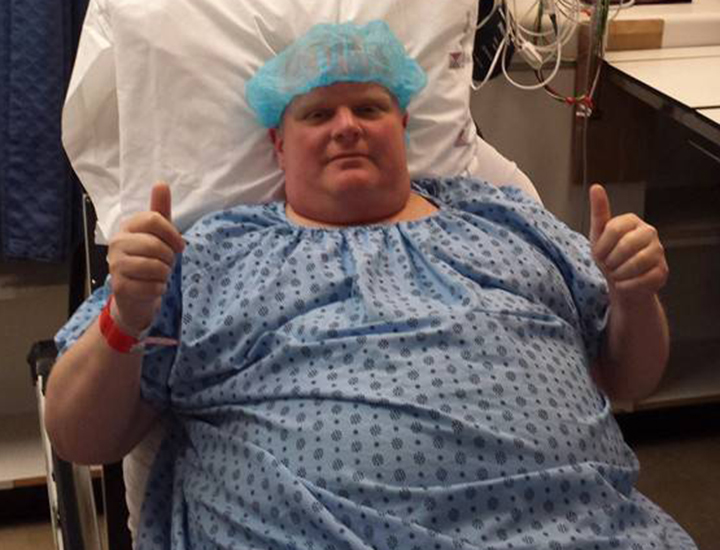

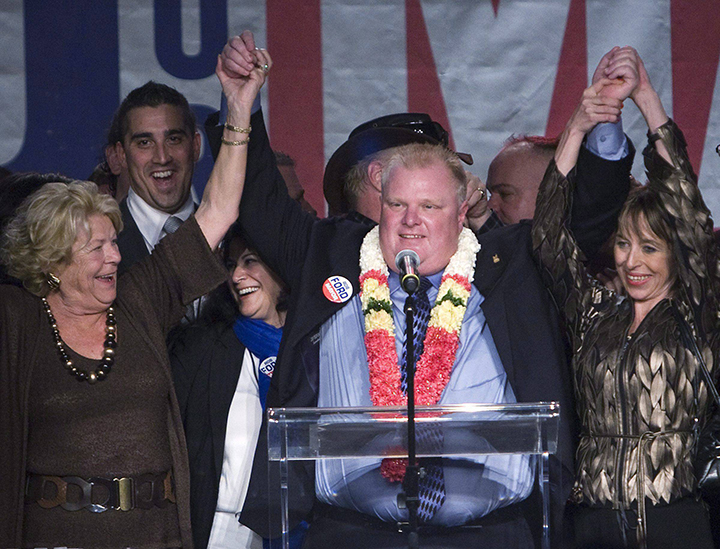
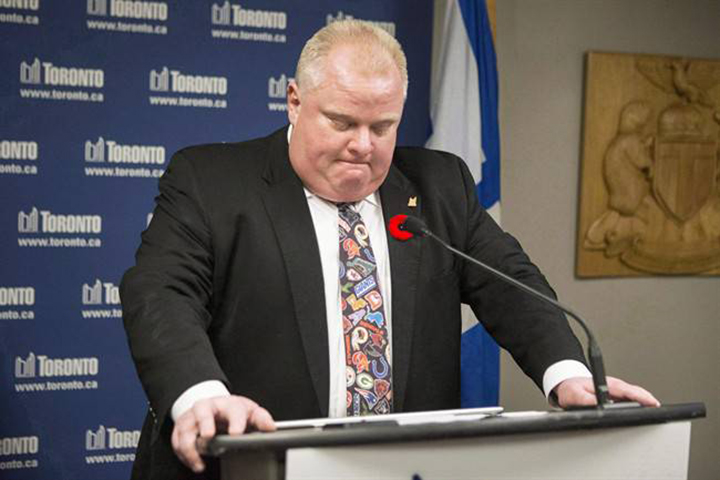



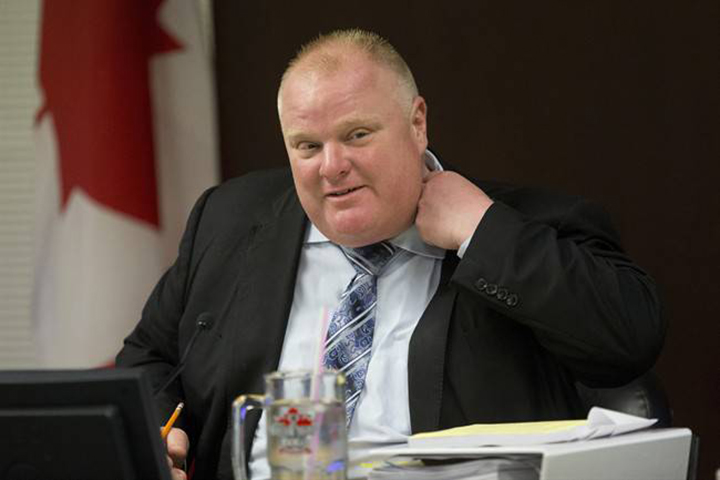

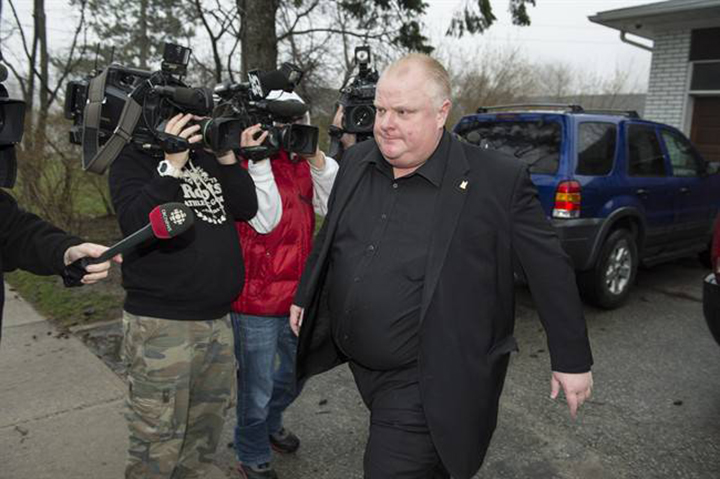
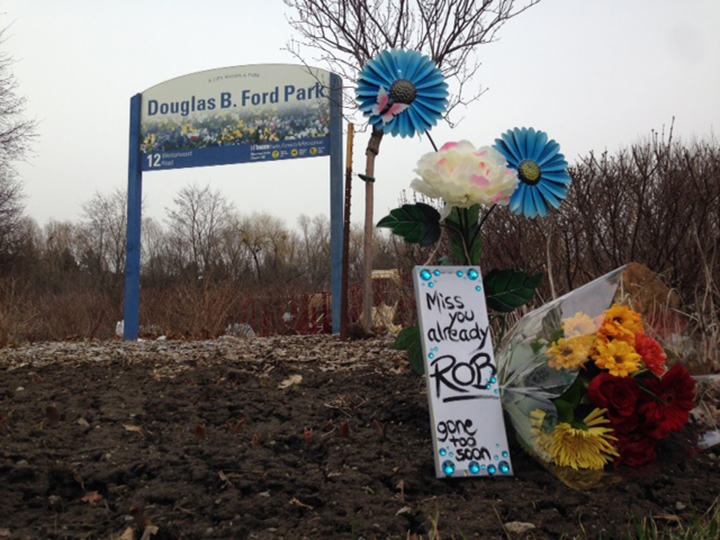
Comments